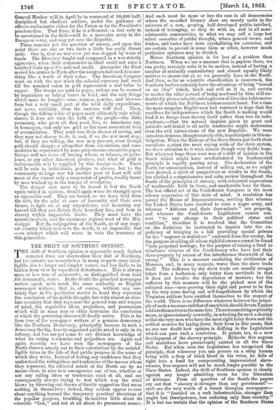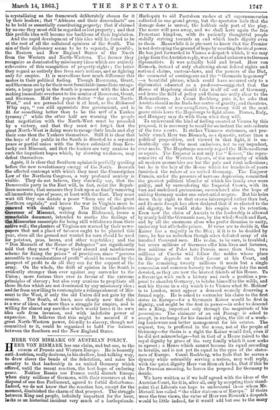THE DRIFT OF SOUTHERN OPINION. T HE drift of Southern opinion
is apparently much farther removed from our observation than that of Northern, but its currents are nevertheless in many respects more intel- ligible, due to larger and simpler causes, and less liable to be hidden from view by superficial disturbances. This is always more or less true of aristocratic, as distinguished from bond fide democratic, states. In the South the principal newspaper writers speak with much the same authority as English newspaper writers ; that is, of course, without any cer- tainty that in the particular matter in hand they represent the conclusion of the public thought; but with almost an abso- lute certainty that they represent the general tone and temper of mind, the regulative ideas, prejudices, and persuasions which will in some way or other determine the conclusion at which the governing classes will flu ally arrive. This is far from true of the newspaper writers of a genuine democracy like the Northern Democracy, principally because in such a democracy the big, loosely-organized public mind is only in its infancy, and has not yet come to any distinct knowledge of what its ruling tendencies and prejudices are. Again and again recently we have seen the newspapers of the North thrown utterly out in their calculations by the unintel- ligible turns in the tide of that public purpose in the name of which they write. Instead of feeling any confidence that they understand the ruling ideas and tendencies of the masses whom they represent, the editorial minds of the North are by no means clear, in nine new emergencies out of ten, whether or not any ruling ideas or tendencies exist at all, and are consequently always trying to test which way the wind blows by throwing out straws of ductile suggestion that mean nothing in themselves ; indeed, they seldom appear to care about anything beyond the temporary practical directions of the popular purpose, troubling themselves little about its scientific "law," and not at all about its permanent cause3. And such must be more or less the case in all democracies where the so-called literary class are merely units in the universe of a raw, groping half-developed public intellect, instead of belonging, as they do with us, and in all semi- aristocratic communities, to what we may call a large but select committee of public thought, whose general views, and wishes, and testes have been crystallizin,sfor centuries, and are certain to prevail in some form or other, however much particular opinions may be divided. Hence Southern opinion is far less of a problem than Northern. When we see a measure that is popular there, we can pretty certainly refer it to its motive, instead of having a number of mutually contradictory and almost equally likely motives to choose out of, as we generally have in the North. And then, so far as scientific classification is concerned, the Southern leaders certainly have the advantage of being "horsed on an idea" which, black and evil as it is, and certain to master the rider instead of being mastered by him still un- doubtedly gives a velocity and si nglen ess of direction to is move- ments of which the Northern leaders cannot boast. For a time the more sanguine Englishmen had ventured to hope that the sacrifices for independence which the South is making would lead it to forego even slavery itself rather than lose its inde- pendence,—that the natural impulse given by great and patriotic self-denial to all noble tendencies might undermine even the evil corner-stone of the new Republic. We were ourselves desirous, though scarcely able, to participate in this an- ticipation. When the Bishops of the Slave States put forth their manifesto against the more crying evils of the slave system, we drew attention to it with sincere though very feeble hope. But whatever hope there ever was of a drift of opinion in the South which might have revolutionized its fundamental principle is rapidly passing away. The declaration of the North for emancipation, instead of calling out, as we might have desired, a spirit of competition or rivalry in the South, has elicited a comprehensive and calm review throughout the South of the principles of slavery, with reiterated expressions of unalterable faith in them, and unalterable love for them. The last official act of the Confederate Congress is the most solemn expression of this state of mind. A resolution has passed the House of Representatives, reciting that whereas the United States have resolved to raise a negro army, and whereas "Africans and their descendants" are property, and whereas the Confederate Legislature cannot con- sent "to any change in their political status and condition," therefore it is resolved that the Committee on the Judiciary be instructed to inquire into the ex- pediency of bringing in a bill providing special prisons for the "negroes or mulattoes" captured from the enemy, for the purpose of selling all whose rightful owners cannot be fOund "into perpetual bondage, for the purpose of raising a fund to reimburse citizens of the Confederacy who have lost their slave-property by reason of the interference therewith of the enemy." This is a measure emulating the civilization of Morocco, and, in many respects, worse than the slave trade itself. The sufferers by the slave trade are usually savages taken from a barbarism only better than servitude in that it does not involve the degradation of masters ; but the sufferers by this measure will be the picked men of the coloured race—men proving their right and power to be free by the very same daring and self-forgetfulness by which the Virginian soldiers have entitled themselves to the respect of the world. There is no difference whatever between the princi- ple of such a measure andthat of onewhich should devote Yankee soldiers themselves to the same fate. Thereis somethins. so pitiably mean, so ignominiously cowardly, in selecting for such a destiny asthis the very men who have the most right to lay down and the noblest motives for laying down their lives in this cause, that no one can doubt how opinion is drifting in the Legislature which can pass such a resolution. It points, too to a new development of the slavery principle. Hitherto free negroes and mulattoes have precariously existed in all the Slave States. But when once the Legislature has recognized the principle, that wherever you can pounce on a stray human being with a drop of black blood in his veins, he falls of right into a fund for compensating impoverished slave- owners, free negroes will not be much longer possible in the Slave States. Indeed, the drift of Southern opinion is clearly against any longer admitting room for the liberation of Africans. From all quarters of the South the papers cry out that "slavery is stronger than any government"— such are the very words of a recent Georgian newspaper— that it is "founded on a rock indestructible, stronger than aught but Omnipotence, less enduring only than eternity." It is but too certain that the opinion of the Southern States Is crystallizing on the framework deliberately chosen for it by their leaders ; that "Africans and their descendants" are to be held as essentially constituting properly; that if claimed by no one they must still be regarded as lost property ; and that this prolific idea will become the backbone of their legislation.
And the rapid development of this idea will be found to be at the root of all the collateral opinions of the South. The aim of their diplomacy seems to be to separate, if possible, the Eastern and New England States of the North from the Western and North-Western. The former they recognize as dominated by missionary ideas which are entirely subversive of this recognition of property-rights ; the latter they regard as entirely free from such notions, and as fighting only for empire. It is marvellous how much difference this makes in their political feeling. Though Rosecranz, Grant, and Sherman are by far their most formidable immediate antago- nists, a large party in the South is possessed with the idea of making immediate overtures to the armies of Rosecranz, Grant, and Sherman. Half the papers flatter "the great North- West," and are persuaded that it at least, as the Richmond Whig says, " can still appreciate free government, and is -fit for something better than to be the serf of a Yankee tyranny ;" while the other half are warning the people that negotiation with the North-West must be preceded by a victory, and that they must not forget that the great North-West is doing more to ravage their Lads and slay their sons than the Yankees themselves. Still it is clear that the hope of the public in the South is directed to a separate peace or partial union with the States colonized from Ken- tucky and Missouri, and that the leaders are very anxious to curb the impatient hopes which, by showing weakness, may defeat themselves.
Again, it is clear that Southern opinion is partially quailing before the new revolutionary energy of the North. Beneath the affected contempt with which they treat the Conscription Law of the Northern Congress, a very profound anxiety is visible. They do not believe, they shrewdly say, that the Democratic party in the East will, in fact, resist the Repub- lican measure-' that measure they look upon as finally removing all immediate hope of peace, at least with the East. They must wait till they can dictate a peace "from one of the great Northern capitals;" and hence the war in Virginia must be renewed with double vigour. The titular Confederate Governor of Missouri, writing from Richmond, issues a remarkable document, intended to soothe the feelings of the Missourian conscripts for being still withdrawn from their itt Vve soil; the planters of Virginia are warned by their news- papers- that not a plant of tobacco ought to be planted this year, since all the ground not wanted for corn should be used for potatoes, peas, beans, and other vegetables ; and the "Don Manuels of the House of Delegates" are significantly told that they must "forego their absurd and mischievous scheme for fixing the prices" of provisions, since "persons accessible to considerations of profit" should be coaxed by the prospect of profit to do all they can fur the support of the army. On the whole, the drift of opinion in the South is evidently stronger than ever against any surrender to the Union; more furious than ever in favour of the extreme principles of slavery ; but also very anxious to propitiate all those States which are not dominated by any missionary idea; and far from unwilling to contemplate a relinquishment of Mis- souri to the West, if only the old Union did not gain by the cession. The South, at least, sees clearly now that this is a war of ideas, far more than a struggle for empire, and is willing for almost any sacrifice which would leave it its own idea safe from invasion, and with indefinite power of expansion. It believes that this might be secured if a great North-Western power, friendly to slavery, though not committed to it, could be organized to hold the balance between the Southern and the New England States.































 Previous page
Previous page